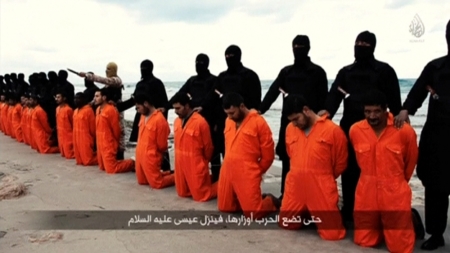Christians Mark Anniversary of 21 Copts Beheaded by ISIS With Church Opening

Relatives of the 21 Coptic Christians beheaded by the Islamic State terrorist group have shared how the tragic deaths of their loved ones has strengthened the faith of the local community.
Three years after their relatives were murdered by IS in the infamous "A Message Signed With Blood to the Nation of the Cross" video, members of the Coptic community of Minya province, Upper Egypt, gathered for the inauguration of a new church, The Church of the Libyan Martyrs, dedicated to the memory of these men.
"We are very happy that we have this wonderful big church named after our martyrs. It is honoring them," Boushra Fawzy, whose 22-year-old son, Kiryollos, was among those killed, told World Watch Monitor.
"We were happy today that a mass for the third anniversary of their martyrdom was held in their church and we felt a great joy during the service, because that was a dream for us."
Fifi Shehata, the daughter of one of the martyrs, told World Watch Monitor that the church building is a visible symbol of her father's faith and how God has sustained her family.
"I am proud that my father is on the pictures in the church. It's a big honor ..." she said. "At first, it was hard to deal with the fact that our father was martyred, but later we felt comforted by God."
Malak, the father of another martyr, shared his pride in the men's refusal to deny Jesus in the face of death.
"We only knew martyrdom from films, but martyrdom was reintroduced and it strengthened our faith because these people, these martyrs, lived among us," he said. "To be honest, I was happy when I saw my son in the video because then I knew the place he had gone to. And when I saw he died with the name of Jesus on his lips, I was very proud. I rejoiced!"
The victims, 20 Egyptian Copts and one Ghanaian Christian, were kidnapped in separate incidents in Libya throughout December 2014 and January 2015. IS later released the video of their execution on Feb. 15, 2015, which shows the Christian men in orange jumpsuits kneeling on the sand as jihadists stood behind them, ready to carry out the executions at a beach near Tripoli.
Militants attempted to persuade the men to deny Jesus in return for their lives; however, they all refused and instead repeated the words, "Lord Jesus Christ."
In 2016, the Christians were registered in the book of martyrs by Coptic Orthodox Patriarch Tawadros II.
According to persecution watchdog group Open Doors USA, family members of the martyrs initiated the building of a church to honor all 21 men just three months after the video was released. This house of worship, they proposed, would be built in Upper Egypt's Minya province in the agricultural village of al Aour, the area where 13 of the martyred Egyptians lived.
While Egyptian President el-Sisi authorized the building of the church and reportedly said the church must be built in honor of the martyrs, but construction slowed as it met ongoing resistance from the large Muslim population in the region.
As part of the church's inauguration last week, the bodies of all 21 victims were expected to be reburied in one big coffin inside the church. However, World Watch Monitor reports that the families were still waiting for their loved ones' remains to be returned to them and had not been told when exactly it would happen.
Egypt ranks No. 17 on the 2018 World Watch List for both radical Muslim persecution resulting in violence as well as social pressures interfering with jobs, schools and churches.
Copts are the native Christians of Egypt, accounting for about 10 percent of the country's 88 million people.





















